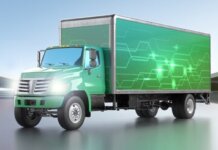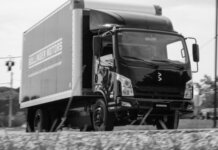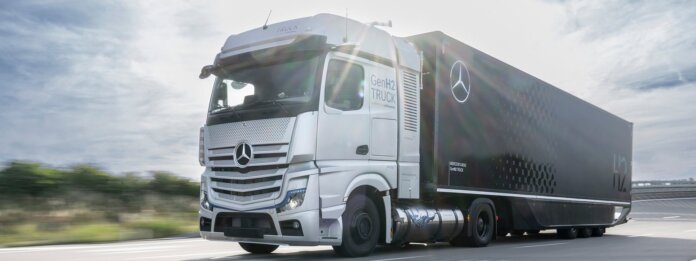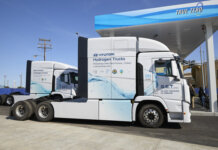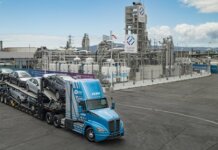Daimler Truck is entering the next development phase on the road to decarbonize transportation with hydrogen-powered trucks. After a rigorous testing phase on the test track and on public roads, the fuel-cell trucks have now reached an advanced development stage for deployment in customer fleets. Consequently, Daimler Truck is now building the first customer trial fleet of Mercedes-Benz GenH2 Trucks.
Expected in mid-2024, Amazon, Air Products, INEOS, Holcim and Wiedmann & Winz will take part in the first customer trials to gain initial experience in CO2-free long-distance transport with fuel-cell trucks.
The five semi-trailer tractors will be deployed in different long-haul applications on specific routes in Germany, such as the transport of building materials, sea containers or cylinder gases. During these first customer trials, the GenH2 Trucks remain under the direct supervision and responsibility of Mercedes-Benz Trucks. The vehicles will be refueled at designated public liquid hydrogen filling stations (sLH2) in Wörth am Rhein and in the Duisburg area.
Daimler Truck and its partner companies are thus creating a lighthouse project and demonstrating that decarbonized transport with hydrogen-powered trucks is already possible. However, for the transformation to succeed, it will be necessary in the coming years to ensure the build-up of an international refueling infrastructure and a sufficient supply of green liquid hydrogen.
“With this first customer fleet, our fuel-cell trucks are now being tested in real customer operation,” says Andreas Gorbach, member of the Board of Management of Daimler Truck AG, responsible for Truck Technology. “A win-win situation for both sides: our customers get to know fuel-cell technology in daily real-life operation, and our engineering team gets to better understand customer needs and relevant use cases, taking them into account for series development.”
Wiedmann & Winz, based in Geislingen an der Steige (Baden-Württemberg) will be one of the first companies to test the Mercedes-Benz GenH2 Truck. For the international logistics service provider DP World, the hydrogen-powered vehicle will transport sea containers to and from industrial and commercial customers. Managing Director Dr. Micha Lege sees a high deployment potential for the innovative truck, particularly on pan-European logistic routes.
“Our company has always been a frontrunner when it comes to innovation,” says Lege. “Through FleetBoard, for example, Wiedmann & Winz was one of the first companies to rely on telematics and digitalization in the logistics industry. We have also recently started deploying an eActros 300 as a tractor in everyday haulage operations. Now we are looking forward to taking the next step with the GenH2 Truck, testing a long-haul truck with hydrogen fuel-cell drive.”
John H. Landwehr, whose logistics company Gerdes + Landwehr is part of the Holcim Group, intends to transport granulates and minerals for the building material industry with the Mercedes-Benz GenH2 Truck.
“Payload has always played an important role in our bulk logistics when it comes to CO2-footprint and efficiency,” says Landwehr. “After extensive tests with battery-electric trucks, we are delighted to continue exploring the path toward sustainable transport with a hydrogen-powered truck. Only with our own specific experience can we make the right decisions for the change that begins in 2025 in our business group.”
“Air Products is planning to convert its entire global fleet to hydrogen-powered vehicles and is proud to be involved in this lighthouse project with Daimler Truck, a leader in heavy-duty transportation and decarbonization,” says Caroline Stancell, general manager–Hydrogen for Mobility, Europe and Africa, Air Products. “The Mercedes-Benz GenH2 Truck will be deployed in our existing fleet to transport cylinder gases, allowing us to gain valuable experience in the field of industrial gas transport. We are also proud to be providing Daimler Truck with some of the necessary refueling infrastructure and hydrogen as part of the trials. Our latest mobile fueling station for liquid hydrogen will be used for the project in the Duisburg area and can therefore operate under real conditions.”
For the first time, a new refueling process for liquid hydrogen will be used in the customer-trial fleet: the so-called “sLH2 technology” (sLH2 = “subcooled” liquid hydrogen). The technology was developed jointly with Linde and is freely available to all interested companies via an ISO standard. The innovative approach enables, among other things, an even higher storage density compared with LH2 and easier refueling within 10 to 15 minutes.
Development engineers at Daimler Truck have based the GenH2 Truck on the characteristics of the conventional Mercedes-Benz Actros long-haul truck in terms of payload, range and performance. The Mercedes-Benz GenH2 Trucks, which are used in these first customer trials offer a payload of about 25 tons at a gross combination weight (GCW) of 40 tons. Two special liquid hydrogen tanks and a particularly powerful cell-centric fuel-cell system enable this high payload and long range. They represent the centerpiece of the GenH2 Truck.
The two stainless-steel liquid-hydrogen tanks of the GenH2 Truck have a high storage capacity of 88 kg (44 kg each) which make them well suited for covering long distances. The stainless-steel tank system consists of two tubes, one within the other, that are connected to each other, and vacuum insulated.
The fuel-cell system of the GenH2 Truck delivers 300 kW (2 x150 kW), and the battery provides an additional 400 kW temporarily. At 70 kWh, the storage capacity of the battery is relatively low, as it is not intended to meet energy needs, but mainly to be switched on to provide situational power support for the fuel cell, for example during peak loads while accelerating or while driving uphill fully loaded. At the same time, the relatively light battery allows a higher payload. It is recharged with braking energy and excess fuel-cell energy.
A core element of the sophisticated operating strategy of the fuel-cell and battery system is a cooling and heating system that keeps all components at a suitable operating temperature, thus ensuring maximum durability. In a pre-series version, the two electric motors are designed for a total of 2 x 230 kW continuous power and 2 x 330 kW maximum power.

